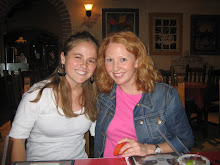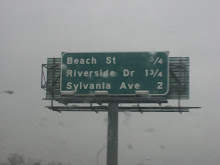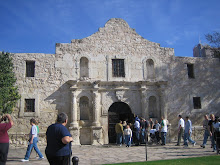Wednesday, April 30, 2008
Mid-Week
At the senior meeting to start the day, Mr. McCain introduced some new organizational strategies to get the girls on track. At the beginning of each day, he suggested they spend 5 minutes to organize their things to do and things to accomplish for that day. At the end of each day, he is now requiring them to write a paragraph about the achievements for the day. The paragraph reflection will be turned in to him as evidence of their progress. He also provided them with a check list of the ultimate things to complete in order to graduate. He explained that some of them would be able to check off the first three things immediately because academically they are eligble to graduate. After the meeting, the girls set to work and I offered my help. I observed Mr. Woodard's class as they learned about three equation, three variable elimination. I then returned to the senior workroom where the girls were spending time with Ms. Marc to make up math not-yets. It was during this period that I discovered how poor these girls' math skills are and how much they rely on a calculator. A simple addition or multiplication problem required the use of the calculator. At first, I thought it was a bad habit and that they really didn't need the calculator, but when I was explaining exlimination to a girl, she had to commute -8-2 and she couldn't do it in her head. I attempted to give her a visual with the number line explaining that when you subtract two, the number goes further to the left or negative. These girls are so desperate to make up thier not-yets that they spend 5 minutes learning an outcome before they want to take the quiz. I think there is value in not giving up on their possibility to graduate, but I predict they will not remember these math skills a week from now. Before lunch I went down to talk to Mr. Woodard about the math program and assessment method. I learned that they have been using IMP since the day the school opened. After looking at one of the textbooks, I saw that every day is planned by the book. They do their POW or problem of the week at the beginning of the week and then the lessons for each day are layed out. The book has problems that relate the skills to the real world which I find refreshing, but the strict structure of the curriculum is questionable. I figured out that the 7th graders take connected math along with a problem solving class three times a week, 8th graders take IMP 1, and if they pass IMP 1 they continue through the program advancing one level each year, so the highest math class offered is IMP 5 which correlates to algebra 2 with a little bit of pre-cal. I also found out that there are 5-7 outcomes for each unit and each student is given a HP (high performing), P (proficient), or NY (not-yet) based on evidence or lack there of showing the student's understanding of each outcome. They are in the process of creating outcome maps to specifically defined what constitutes each level of performanace. The class covers 3-4 units a year and in order to pass the class, students have to have received a P or HP on 70% of their outcomes. At the end of each unit, students create a math portfolio similar to the one Ms. Louie showed during her presentation on Monday. After learning about the math department, I talked with a special education teacher about YWLCS's SPED department. She explained the school believes in full inclusion having students in the mainstream classroom as much as possible, but there are aids in the classroom and a resource room to use for support. The SPED department worries that they will have too many students with special needs because in the application process they can not ask students about their abilities. During the two open houses offered throughout the year for prespective students, the SPED teachers do not hesitate to talk to parents about what they can and can not provide to ensure that parents are choosing the best school for their child. After lunch, I went to the professional development meeting where they began with a film on Courageous Conversations, which is a program YWLCS just adopted that promotes talking about the issue of race in education and academic achievement to narrow the gap. The video was extremely interesting and thought provoking. The major idea of the film was that academic achievement is not only a socioeconomic issue, but a race issue. The film showed data separated by socioeconomic status with sub cateogries of race, showing the average SAT score for each group. Although scores improved with each step up in socioeconomic status, the richest black student's score was the same as the poorest white student's score. This data can not be argued, it just needs to be addressed. I believe the first step is figuring out why this is the case and taking necessary steps to close the gap. The film raised many questions in my mind, but answered very few. They had planned to debrief the film, but an issue came up with a student and so after the film we headed straight into the academy meetings. I attended the senior academy meeting where they discussed seniors who are struggling to meet the graduation requirements. They decided to call the parents in for a meeting to explain the situation and give the parent and student options for summer school and enrolling in the fall. That is one great thing about this school, it is common for students to stay until they graduate no matter how long it takes them.
Subscribe to:
Post Comments (Atom)



































No comments:
Post a Comment